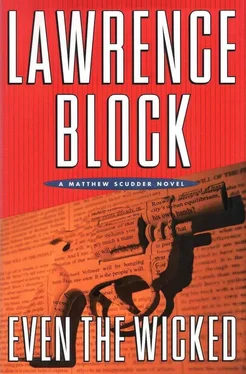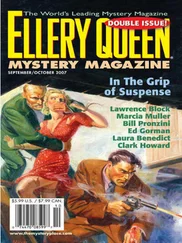“Which one? After I got him on tape, he walked into the Sixth Precinct and told them the same story all over again. After they’d given him the Miranda warning. And they videotaped the whole thing, including Miranda.”
“Fruit of the poisoned tree. The first confession was improperly obtained—”
“The hell it was.”
“—so that makes all further confessions suspect.”
“That doesn’t make any sense.”
“Well, probably not, but I’d think of something. The point is that’s not what he wants, but I think I can carry on enough when I sit down with the DA’s guy to strike a pretty good deal for him.” He speculated some about that, and then said, “I wonder what happens to the money.”
“What money?”
“The hundred and fifty thousand. Integrity Life paid the claim, double indemnity and all, and the money’s sitting in Havemeyer’s savings account in Lakewood. He hasn’t spent a penny of it.”
“I don’t suppose he gets to use it to pay his attorney.”
“He doesn’t get to do anything with it. You can’t legally profit as the result of the commission of a crime. If I’m convicted of killing you, I can’t inherit your property or collect on your life insurance. Basic principle of law.”
“And a reasonable one, from the sound of it.”
“I don’t think anybody’s likely to argue the point, though it’s had a few unfortunate effects. There was that dame who killed the diet doctor a few years back. Her lawyer could have pleaded her guilty with extenuating circumstances, and just about got her off with time served and community service, but she had no money of her own and she stood to inherit under the terms of the doc’s will. But she had to be found not guilty for that to happen, so the lawyer gambled and lost, and his client wound up with long prison time. Now was his decision colored by the knowledge that she had to inherit for him to get paid? No, absolutely not, because we attorneys are never influenced by such considerations.”
“Thank God for that,” I said.
“Havemeyer’s going to plead,” he said, “so the money’s not going to be his. But what happens to it?”
“The insurance company gets it back.”
“The hell they do. They collected premiums all those years, they accepted the risk, and they owe the money. The full amount, too, because murder fits the definition of accidental death. They’ve got to pay it to somebody, but to whom?”
“To Byron Leopold’s estate, I guess. Which means a couple of AIDS charities.”
“That would be true,” he said, “if Leopold still owned the policy. In that case Havemeyer would be excluded as beneficiary and Leopold’s estate would receive the funds. But Leopold transferred ownership of the policy for value received. He’s out of the picture.”
“What about Havemeyer’s heirs?”
“Uh-uh. Havemeyer never has title to the money. He can’t pass on what’s never been his in the first place. Never mind the fact that nobody can inherit anything from him while he’s still alive. But that does bring up a question. Havemeyer owned the policy and named himself as beneficiary. But did he name a secondary beneficiary, in the event that he might predecease Leopold? He might not have bothered, figuring that if he died before Leopold did, the money payable to him on Leopold’s death would simply be paid to his estate.”
“Havemeyer’s estate, you mean.”
“Right. In other words, why bother to designate a secondary beneficiary if the money’ll go to him anyway? There are reasons, as it happens. The money doesn’t have to wait until the estate goes through probate. But he might not have been so advised, or he might not have bothered. But if he did, can the secondary beneficiary benefit?”
“Why not? He wouldn’t be excluded because he wasn’t a party to the murder.”
“Ah, but did Havemeyer enter into the viatical transaction with the prior intent of killing Leopold?”
“He says not.”
“Good for him, but how do we know one way or the other? And if he did, can’t we argue that his criminous intent in fact nullifies the viatical transaction, thereby restoring ownership of the policy to Byron Leopold?”
“So the charities would get the money.”
“Would they? Were they his designated beneficiary before the viatical transaction?”
“Jesus,” I said.
“I assume that was an interjection,” he said, “and not the name of his beneficiary.”
“I know his beneficiary,” I said. “She had to acknowledge that she knew she’d been removed as beneficiary before the viatical transaction could go through.”
“Sure, that’s standard. How do you happen to know her?”
“She’s a friend of mine, she’s in the program. She got me started looking into his death in the first place.”
He laughed aloud. “What do you know about that? She didn’t know it, but she was acting in her own self-interest.”
“You mean she’s going to wind up with the money?”
“She’s got a damn good claim,” he said. “If Havemeyer had it in mind to commit murder, as his subsequent actions would strongly imply, the viatical transaction can be declared null and, void. If it’s void, and policy ownership thereby returns to Leopold, and if she was his beneficiary until such time as he deleted her in order to proceed with the transaction, I’d say she’s effectively reinstated by the transaction’s nullification. I’d certainly be happy to argue that point. Unless I was retained by the charities named in his will, in which case I’d be every bit as happy to argue that his failing to make the woman his heir was evidence of intent to benefit them and not her, and...”
The rest was too legalistic and convoluted for me, but the gist of it was that Ginnie might ultimately come into $150,000. “Tell her to call me,” he said. “I can’t represent her, but I’ll find her somebody who can.”
Ginnie was astonished, of course, and her first reaction was that she wasn’t entitled to the money. Suppose she just let the charities have it? I pointed out that Byron’s intent seemed clear to me, and that she could always ease her conscience down the line by giving part of the proceeds to the charities.
“Anyway,” I said, “you earned it. If you hadn’t got me started looking for Byron’s killer, the money would never get out of Lakewood, Ohio. What Havemeyer didn’t spend on pizza and tea bags he’d leave to his relatives.”
“If anybody earned it,” she said, “you did. Suppose we split it.”
“What, you and I?”
“You, me, and the charities. Three-way split.”
“That’s too much for me,” I said, “and probably too much for the charities, but we can thrash that out later on. In the meantime, call the lawyer.”
I don’t know if there was a connection, but the day after I had that conversation with Ginnie I went out and did my Christmas shopping. I didn’t know that she’d wind up with the insurance proceeds, nor could I presume on the basis of an impulsive remark of hers that she’d share what she got with me. But the prospect of a windfall, however slender and remote, evidently succeeded in infusing me with the Christmas spirit. I didn’t empty my pockets into the Salvation Army kettles, I didn’t sashay down the street whistling “Away in the Manger,” but I did somehow manage to brave the crowds in the midtown stores and buy enough presents to cover all the bases.
A shop on Madison Avenue was the source of gifts for my sons, Mike and Andy, and Mike’s wife, June, and I was able to arrange to have everything shipped — the briefcase and woven-leather handbag to Michael and June in San Jose, the binoculars to Andy in Missoula, Montana, where he’d recently wound up after brief stints in Vancouver and Calgary.
Читать дальше












